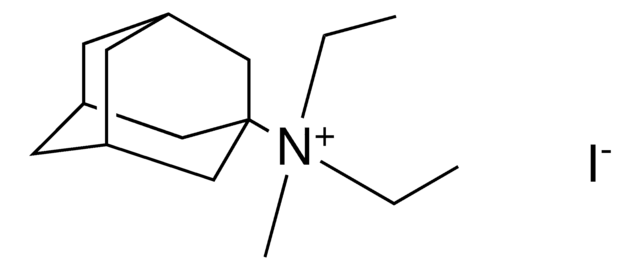1.04727
Isooctan
for analysis EMSURE® ACS,Reag. Ph Eur
Synonym(e):
2,2,4-Trimethylpentan, 2,2,4-Trimethylpentan, Isobutyltrimethylmethan, iso-Octan, Isooctan
About This Item
Empfohlene Produkte
Qualität
ACS reagent
Qualitätsniveau
Agentur
reag. Ph. Eur.
Dampfdichte
3.9 (vs air)
Dampfdruck
41 mmHg ( 21 °C)
Produktlinie
EMSURE®
Assay
≥99.5% (GC)
Form
liquid
Selbstzündungstemp.
745 °F
Wirksamkeit
>2500 mg/kg LD50, oral (Rat)
Expl.-Gr.
6 %
Verunreinigungen
≤0.0003 meq/g Acidity
≤0.005% Sulfur compounds (as S)
≤0.01% Water
Abdampfrückstand
≤0.001%
Farbe
APHA: ≤10
Durchlässigkeit
250-420 nm, ≥98%
Brechungsindex
n20/D 1.391 (lit.)
pH-Wert
7
bp
98-99 °C (lit.)
mp (Schmelzpunkt)
−107 °C (lit.)
Übergangstemp.
flash point -12 °C
Dichte
0.692 g/mL at 25 °C (lit.)
Kationenspuren
Al: ≤0.00005%
B: ≤0.000002%
Ba: ≤0.00001%
Ca: ≤0.00005%
Cd: ≤0.000005%
Co: ≤0.000002%
Cr: ≤0.000002%
Cu: ≤0.000002%
Fe: ≤0.00001%
Mg: ≤0.00001%
Mn: ≤0.000002%
Ni: ≤0.000002%
Pb: ≤0.00001%
Sn: ≤0.00001%
Zn: ≤0.00001%
Lagertemp.
2-30°C
SMILES String
CC(C)CC(C)(C)C
InChI
1S/C8H18/c1-7(2)6-8(3,4)5/h7H,6H2,1-5H3
InChIKey
NHTMVDHEPJAVLT-UHFFFAOYSA-N
Suchen Sie nach ähnlichen Produkten? Aufrufen Leitfaden zum Produktvergleich
Anwendung
- Behavior of acetyl modified amino acids in reverse micelles: a non-invasive and physiochemical approach: In dieser Studie wird Isooctan in reversen Mizellen verwendet, um das Verhalten von Acetyl-modifizierten Aminosäuren zu untersuchen. Die Ergebnisse unterstreichen die Rolle von Isooctan bei der Ermöglichung nicht invasiver und physikochemischer Analysen und unterstreichen seine Bedeutung in der analytischen Chemie und biochemischen Untersuchungen (Mehta et al., 2007).
- Nonionic surfactants: a key to enhance the enzyme activity at cationic reverse micellar interface: Die Forschungsarbeit untersucht den Einsatz von Isooctan bei der Bildung kationischer reverser Mizellen mit nichtionischen Tensiden zur Verstärkung der Enzymaktivität. Die Wirksamkeit von Isooctan unterstreicht in diesem Zusammenhang seinen Wert in der Biokatalyse und in enzymatischen Untersuchungen (Shome et al., 2007).
- Lecithin organogels used as bioactive compounds carriers. A microdomain properties investigation: Diese Studie untersucht die Anwendung von Isooctan in Lecithin-Organogelen für den Transport bioaktiver Verbindungen. Die Rolle von Isooctan bei der Stabilisierung der Mikrodomänen innerhalb der Organogele ist entscheidend für ihre Wirksamkeit in Arzneimittelverabreichungssystemen (Avramiotis et al., 2007).
- Switching electrical conductivity in an AOT-isooctane-water microemulsion through photodimerization of solubilized N-methyl-2-quinolone: Diese Forschungsarbeit zeigt die Verwendung von Isooctan in AOT-Wasser-Mikroemulsionen, um die elektrische Leitfähigkeit durch Photodimerisierung zu ändern. Die Studie unterstreicht den Nutzen von Isooctan bei der Entwicklung reaktionsfähiger Materialien für fortschrittliche chemische und physikalische Anwendungen (Bufe und Wolff, 2006).
- Photochromism of crown ethers with incorporated azobenzene moiety: Isooctan wird zur Untersuchung des Photochromie von Kronenethern mit Azobenzol-Gruppen verwendet. Die Ergebnisse unterstreichen die Rolle von Isooctan bei der Ermöglichung der Untersuchung photoreaktiver Materialien, die für die Materialwissenschaft und die Photochemie relevant sind (Janus und Sworakowski, 2005).
Hinweis zur Analyse
Identität (IR): entspricht
Farbe: ≤ 10 Hazen
Acidität: ≤ 0,0003 meq/g
Dichte (d 20 °C/20 °C): 0,691 - 0,696
Brechungsindex (n 20/D): 1,391 - 1,393
Siedebereich (98-100 °C): ≥ 95 % (v/v)
Schwefelverbindungen (als S): ≤ 0,005 %
Verhalten gegen Schwefelsäure: entspricht
Durchlässigkeit (zwischen 250 nm und 420 nm): ≥ 98 %
Al (Aluminium): ≤ 0,00005 %
B (Bor): ≤ 0,000002 %
Ba (Barium): ≤ 0,00001 %
Ca (Calcium): ≤ 0,00005 %
Cd (Cadmium): ≤ 0,000005 %
Co (Cobalt): ≤ 0,000002 %
Cr (Chrom): ≤ 0,000002 %
Cu (Kupfer): ≤ 0,000002 %
Fe (Eisen): ≤ 0,00001 %
Mg (Magnesium): ≤ 0,00001 %
Mn (Mangan): ≤ 0,000002 %
Ni (Nickel): ≤ 0,000002 %
Pb (Blei): ≤ 0,00001 %
Sn (Zinn): ≤ 0,00001 %
Zn (Zink): ≤ 0,00001 %
Abdampfrückstand: ≤ 0,001 %
Wasser: ≤ 0,01 %
Entspricht ACS, ISO, Reag. Ph Eur
Rechtliche Hinweise
Signalwort
Danger
Gefahreneinstufungen
Aquatic Acute 1 - Aquatic Chronic 1 - Asp. Tox. 1 - Flam. Liq. 2 - Skin Irrit. 2 - STOT SE 3
Zielorgane
Central nervous system
Lagerklassenschlüssel
3 - Flammable liquids
WGK
WGK 2
Flammpunkt (°F)
10.4 °F - closed cup
Flammpunkt (°C)
-12 °C - closed cup
Analysenzertifikate (COA)
Suchen Sie nach Analysenzertifikate (COA), indem Sie die Lot-/Chargennummer des Produkts eingeben. Lot- und Chargennummern sind auf dem Produktetikett hinter den Wörtern ‘Lot’ oder ‘Batch’ (Lot oder Charge) zu finden.
Besitzen Sie dieses Produkt bereits?
In der Dokumentenbibliothek finden Sie die Dokumentation zu den Produkten, die Sie kürzlich erworben haben.
Kunden haben sich ebenfalls angesehen
Unser Team von Wissenschaftlern verfügt über Erfahrung in allen Forschungsbereichen einschließlich Life Science, Materialwissenschaften, chemischer Synthese, Chromatographie, Analytik und vielen mehr..
Setzen Sie sich mit dem technischen Dienst in Verbindung.










